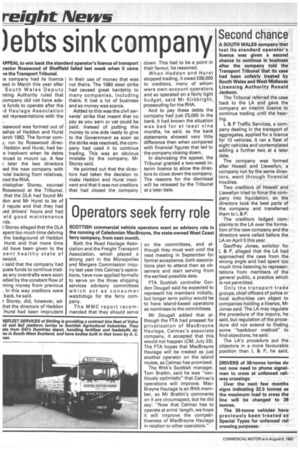reight News
Page 8

If you've noticed an error in this article please click here to report it so we can fix it.
)ebts sink compan
‘PPEAL to win back the standard operator's licence of transport :rector Rosswood of Sheffield failed last week when it came re the Transport Tribunal.
le company had its licence sed in March this year after South Wales Deputy nsing Authority ruled that company did not have ade:e funds to operate after the id Haulage Association led representations with the
)sswood was formed out of ashes of Haddon and Hurst larch 1982. The former comb run by Rosswood direcHaddon and Hurst, had bee insolvent when its debts inued to mount up. A few ; later the two directors led the new company with -Ida] backing from relatives, ned the RHA.
iristopher Storey, counsel Rosswood at the Tribunal, that the DLA had found Mr don and Mr Hurst to be of J repute and that they had ,red drivers' hours and had eld good maintenance rd s.
r Storey alleged that the DLA spent too much time delving the background of Haddon Hurst and that more time Ald have been given to the sent healthy state of ;wood.
.1 said that the company had luate funds to continue tradas any overdrafts were soon :elled by the constant flow of ming money from previous . In this way creditors were back, he said.
r Storey, did, however, adthat the directors of Haddon Hurst had been imprudent in their use of money that was not theirs. The 1980 steel strike had caused great hardship to many companies, including theirs. It lost a lot of business and so money was scarce.
Added to this was the civil servants' strike that meant that no pay as you earn or vat could be paid. Instead of putting this money to one side ready to give to the Government as soon as the strike was resolved, the company had used it to continue trading. This was an obvious mistake by the company, Mr Storey said.
He pointed out that the directors had taken the decision to make Haddon and Hurst insolvent and that it was not creditors that had closed the company down. This had to be a point in their favour, he reasoned.
When Haddon and Hurst stopped trading, it owed £66,000 to creditors, many of whom were own-account operators and so operated on a fairly tight budget, said Mr Kirkbright, prosecuting for the RI-IA.
And to pay these debts the company had just £5,000 in the bank. It had known the situation was bad for at least nine months, he said, as the bank statements showed very little difference then when compared with financial figures that led to the company closing down.
In dismissing the appeal, the Tribunal granted a two-week interim licence to allow the directors to close down the company. The reasons for the dismissal will be released by the Tribunal at a later date.
































































































